This post may contain affiliate links. Read my disclosure policy here.
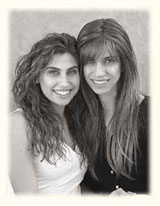
Janice: Claire and Mia, I am sincerely honored to have a chance to talk with you and share your story with our readers. Come Back is a book that I will never forget and you did an incredible job drawing us into your story.
You are both gifted writers. Claire, can you tell us a bit about your background and where you are working today? Mia, you recently graduated from a major university. Where are you working now?
Claire: Thank you for your compliments on the book. We feel honored to be here. I was a professional screenwriter for many years. Come Back is my first book. I’m currently working on a proposal for a short, humorous book that offers ways to enhance your life.
I’m also creating, with Mia, mother/daughter retreats for 2007 that will give moms and adult daughters a week of pampering together that will include ways they can take their relationship to the next level. Women shouldn’t have to go “through hell and back” the way we did to forge a stronger bond – having fun works just as well and creates much better memories!
Mia: I am currently working in the publicity department for a book publishing company. Seeing the process by which books are made fascinated me throughout the writing of Come Back, so upon completion, I applied for a job within the industry. I’ve always loved books, so it’s a dream to get paid to read books and get the word out. My mom and I are also beginning national speaking engagements. Our next one is at the Detroit Jewish Book Fair next month, the largest such fair. Elie Wiesel is speaking as well, so we’re pretty excited.
Janice: The rare gift of Come Back is that together you chronicle Mia’s descent into the hell of addiction, both of you as tormented and alone as the other, so your readers feel the pain you each experienced from your own unique perspectives. Whose idea was it to write the book? Was the idea always to write it together as you have done?
Claire: We thought of it after she was home for a couple of years. We’ve always seen it as a joint venture. I insisted she wait till she was twenty-one. I wanted her to have a few more years’ perspective and maturity before deciding – and I wanted the choice to write it to be entirely hers.
Mia: To echo my mom, it didn’t seem fair to write it any other way than as two stories side by side. We both experienced the same sequence of events so differently, we each had a story to tell; by sharing our stories in tandem, we figured the reader could discover not just our individual truths, but the truth that often lay between the two. Also, knowing that our biggest audience would be parents, I wanted to give insight into a teenage mind. Since I’m still young enough to vividly remember the mindset from which I operated as a struggling teen, I thought that writing from that perspective could be helpful.
Janice: You had to revisit some agonizing and deeply personal experiences. Was it a hard decision to take those private emotions and experiences to the public?
Claire: No. We don’t feel embarrassed or diminished in any way by sharing our lives. We feel so blessed to have come through the way we did, we felt compelled to share what we learned in the hopes it might help others. We feel privileged to be able to use our lives this way.
Mia: Initially, I was hesitant. However, after thinking about it at length, for the same reason I was hesitant to come forth with my story, I also felt compelled to do so.
Despite everything I did (drugs, running away, etc.,) the thing that I was most nervous to share about was being molested by my father – something I didn’t even do! I figured that, if after all the help I had received, I was still nervous to talk about it, then how must the million of others feel who’ve never even told anyone? The social stigma attached to sexual abuse encourages victims to remain silent, something that protects pedophiles and further punishes victims, it reinforces negative feelings towards themselves.
Janice: As a former youth worker, I watched teens destroy themselves and wished they could understand how much their families suffer with them. But perhaps my point of view is shortsighted. In your story we get a glimpse of the intense guilt teens experience over hurting their families.
So I was wondering, do you think most troubled teens understand how much they are hurting their loved ones? Do they care or are they able to care? And if they do, does their guilt or frustration drive them further into their addictions? Would reading your book be helpful for troubled teens as well as for parents?
Claire: I, along with most of the other parents with kids in these schools, didn’t think our teens felt guilty. They weren’t just awful to themselves, they were awful to the family, too. It wasn’t until I assisted at one of the teens’ seminars at the school that I realized how wrong we were. These punks, addicts, gangbangers, “slutty” young girls, were literally curled up on the floor sobbing uncontrollably over hurting their parents. It was devastating to witness. Just because they hid their guilt behind drugs and defiant behavior doesn’t mean it wasn’t there. All I could hear through my own tears was “I’m so sorry mommy! Please forgive me, daddy!” I still can’t speak about it without crying.
This is a great book for teens. Mia struggled through an extreme version of the same things all teens struggle with – conflicting emotions, peer pressure, insecurity. Teens can see how she came out the other side. They’ll also see that parents struggle with some of the same.
Mia: You’re right, it does drive them into further addiction. When I was fifteen I felt two things – the desire to do what I wanted to do, and intensely guilty that the things I wanted to do devastated everyone who loved me. To escape the guilt, I wanted out – which is why I immaturely thought running away was the perfect solution, and why, for teens that don’t run away, drugs offer a great refuge.
It’s also important to note, however, that, while I cared that I was hurting people, I wasn’t capable of understanding to what degree, because I’d never loved the way a parent does, unselfishly. Also because, as I write in one passage of the book, “you take someone whose life experiences have taught them they’re worthless, string them out on drugs and you have one miserable person. How could I have given what I didn’t have? It’s hard to value another life when you view your own as dispensable, hard to understand how you can have so great an effect on someone else when you don’t think you matter.” Which is how someone who’s been abused feels about themselves. It didn’t matter how much my mom or step dad loved me – how much could I be worth if my own father did such horrible things to me?
I do think this book can help teens because how I, and the other kids in the book, felt was just an extreme version of how most teens feel. I deliberately detailed my transformation in such a way that the reader goes through it with me, step by painful step. They can see what I was feeling, why I decided to make different choices, and how I went about doing that. I also think that reading my mother’s passages will be very enlightening!
Janice: Reading your journey to healing inspired me to become more accountable with my own issues and my fear-driven behaviors. Did you set out to write a book that not only told your story but also helped your readers to recognize their own stories, or was that a byproduct that evolved as you wrote?
Claire: Before we began, we spent a lot of time focusing on what our purpose was. We knew we had a dramatic story and as a screenwriter I knew how to structure it, but that wasn’t reason enough for us. We asked ourselves: what were the results we wanted to create? So many people are suffering or simply not living up to their potential, and they rarely realize that they have everything they need within them to transform their lives. We were so empowered by what we learned, it literally changed the way we see ourselves and how we live our lives; we knew that if we could do it, anyone can. It’s just a matter of awareness. We wanted to help create that awareness.
Mia: After being in a school for two years where all we essentially did was observe and analyze human behavior, all I need is little bit of time with a person to be able to tell you what their core beliefs and fears are. We’re more transparent than we think and when I came home from the program it was as though everywhere I looked, I could see people both as they are and as they could be if they operated as their best selves. While speaking out about sexual abuse was my most obvious purpose in writing the book, I also wanted to share with people the lessons and tools I learned so that others may apply it to, and possibly better, their own lives.
Janice: What advice do you have for parents? What do you hope they learn from reading your book?
Claire: To hold yourself, and your teen, fully accountable, realizing that being accountable doesn’t mean being “wrong.” It means taking an honest look at your thoughts, beliefs and actions, seeing what didn’t work, and then committing to making new choices based on that. It’s about lessons, not blame. About staying aware in each moment, asking yourself, “what am I creating right now? Are my words and actions enhancing or sabotaging my life and the lives of others?”
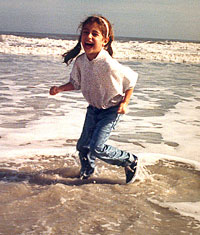
Another eg., my mother has never been a happy person. She was a very dutiful mother, home made dinners, a spotless house. What I internalized was not how important it was to be a good homemaker, it was “life is not a happy place.” Which became the little unconscious engine that drove my behavior and, ultimately, Mia’s as well to a great degree. This shift in understanding yourself and what ‘runs’ you, is subtle but powerful.
Mia: I think my mom pretty much summed everything up, but one thing I’d like to add is that parents often have just as much guilt as their kids do when things go “wrong.” Since you don’t know how to stop the ball from rolling down the hill, you try to distract it, you throw things in it’s way – here, have a gift; you want to go out with your friends even though your room’s a mess and you haven’t done dishes in a year, go ahead; anything you can do to stay connected to your teen who, as each day passes, you know less and less. And while kids use this to manipulate you and get what they want – it also scares them to know they can control their parents (teachers, family friends, shrinks, etc) so easily. Often, it’s best to take the unpopular position and parent – not befriend – your kid.
Janice: Mia, what would you tell an angry, rebellious teenager who is so full of rage and pain that she hates her family and her life?
Mia: I wouldn’t tell them anything, rather I would ask them to tell me things – how they’re feeling, what their life used to be like, what it looks like now, if they’re happy (and if they’re lying about this, call them on it), etc. I’d like to learn where they’re coming from and then based on that, decipher the basic belief that’s driving their behavior. I truly believe that all self-destructive behavior stems from some core belief, i.e., I’m not good enough, I’m a screw-up, I’m stupid, I’m ugly, fat, etc. But before someone can change a behavior, they have to understand what it’s costing them. I think a lot of teens are so busy running from themselves, that it’s quite a shock when they sit down and really take a look at what their life looks like. And it’s usually in that moment that breakthroughs occur, that you begin to have a desire to do something different with your life. Then you can begin to look at why you began making poor choices in the first place.
Also, for myself, it seemed a given that I would always feel and act how I felt and acted in that moment; because I couldn’t see past the present, there was no impetus to change. I think that a key component in changing behavior is incentive, so in addition to the above, I think it would be important to find out how the person envisioned their life growing up (before they started having problems), and show them that they can still have that, that how their life looks now isn’t what it always has to look like.
Janice: After working with many addicted youth and watching them go through various rehab situations, I have never seen anything like the schools that saved Mia’s life. I wish every troubled teen could have the same experience and every parent could attend the seminars. (I have looked up the seminars myself and am anxiously waiting for one to come to a state near me.) Are these schools still active and do you recommend them to parents looking for help for their children? If so, could you please share the links?
Claire: Our book is about our particular experience at a particular time and place which doesn’t really exist anymore. The schools Mia went to have changed in the six years she’s been out; they’ve changed some policies, gotten very big and many have suffered because of it, so we make no claims about them (though many are good and do save lives.) But there are many schools like it and our website has some good resources. Research any school thoroughly, call as many parents references as you can, if possible talk to parents and teens not referred by the school. Visit schools unannounced. A good school won’t have a problem with that. A skilled educational consultant can help. Ask if they get a referral fee from a school (though that doesn’t always mean their advice is compromised.)
Mia: Since I can’t recommend the schools I was in (one doesn’t exist anymore and the other, as my mother said, has changed dramatically), I’d like to say what worked about them so perhaps parent could try to find schools that offer something similar.
1) Peer-regulation. It’s easier for teens to bs adults than other teens. In order to advance levels where I was, other teens had to approve it.
2) Being held accountable, even if it means confrontation.
3) Parental involvement (there was no compartmentalization; teachers, therapists and parents were all kept on the same page, so kids couldn’t manipulate.)
4) Length. When you know you’re in for the long haul, you eventually lose sight of your old lifestyle and friends, or you get sick of yourself and your own bs, and begin looking towards the future to create something new.
5) Silence. After running away from and numbing yourself to your feelings for so long, being silent much of the time forces you to be with yourself.
6) Being somewhat isolated from popular teen culture while healing, which encourages sex, drugs, alcohol, separation from parents, a lot of negative things. My schools had a positive peer culture that allowed us to be kids again. No TV or magazines, only music and videos that took a life-affirming, moral position. I heard a lot of classical music, Steven Covey and Dale Carnegie!
Janice: Mia’s destruction began at the hands of her father when she was just a tiny child. How can parents be more aware and able to identify abuse when it happens or if it has happened in the past? And if a parent discovers their child has been abused what should they do?
Claire: The first and most important thing is to understand that the danger is not the predator in the news. The following statistic is hard to accept but absolutely without question true – over 80% of all child sexual abuse is intrafamilial. Study after study after study shows this. That means that if you suspect or know that your child has been abused, it’s most likely, by far, your husband, brother, uncle, cousin, sometimes women, too, more than we’d like to admit. Study after study also show, it isn’t even questioned anymore, that one in three girls have been molested by age 18 and one in five boys. That means that there are kids in your neighborhood, schools, your church or temple, or in your family, who go to bed at night either terrified or resigned. Pretty disgusting and disheartening – and very hard to accept.
Our website has excellent resources for counseling, information, where to report abuse or resources on how you can learn to recognize and responsibly respond to sexual abuse. We’ve carefully culled what we’ve found to be the most responsible and responsive agencies and organizations.
Mia: I think it’s also important to simply pay attention.
When I staffed a seminar attended by parents of kids in the program, I was amazed to hear how many parents only just found out that their kids had been abused. One mother’s daughter had been being molested by a neighbor for two years before she was sent to the program. What’s going on in your own life such that you didn’t pick up on the signs? Because they’re always there, verbal and/or non-verbal, even if a child tries to hide them. Unfortunately, so many times when parents suspect abuse, they leave it that, a suspicion – oftentimes because they’re scared to confirm their worst nightmare. It’s easy to be in denial, turn a blind eye, to tell yourself it’s too unbelievable to be true. When dealing with older kids it’s important not to automatically chalk behavioral changes up as normal “teen behavior.” While you can’t say that everyone strung out on drugs was abused, no happy person needs to numb themselves to life, so it’s something to seriously consider.
Janice: The statistics of childhood sexual abuse are staggering. Here are just a few of the stats listed on your website www.claireandmia.com:
• 60-80% of those in drug abuse programs report being sexually abused.
• Over 75% of female juvenile delinquents have been sexually abused.
• Approximately, 95% of teen prostitutes were sexually abused.
Sometimes it feels so overwhelming, like there isn’t much we can do. But in your book and on your website, you talk about PROTECT – the National Association to Protect Children (www.protect.org). Could you briefly explain to us what PROTECT is and how we can be involved and help protect children?
Claire: Protect.org is working hard to strengthen (or create) laws that protect children from sexual, physical and emotional abuse.

Mia: Also, because PROTECT is a PAC (political action committee), they’re able to lobby in Washington and what gives a lobby clout is numbers. The more members a lobby has, the more our elected representatives pay attention, because they know members vote. Congress never cared about dying whales until Greenpeace showed up with a huge membership. We need to do the same thing with our most precious resource, kids. So joining is a small, simple way to help; I did – and I was just a broke college grad!
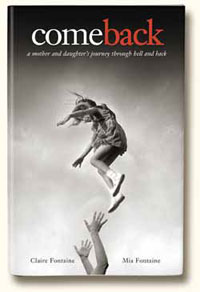
For more information on Come Back visit Claire and Mia’s website www.claireandmia.com and make sure you visit Claire at her blog Claire Du Jour – A Writer’s Eye on Life.
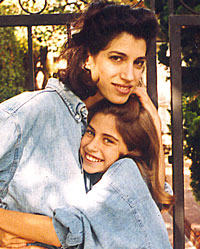
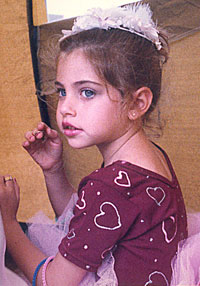
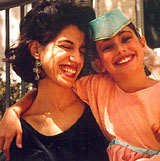









Jennifer says
I’m reading Come Back for the third time. Your story is amazing. Not to mention, beautifully told. Very inspirational in more ways than one. May God continue to bless you both. Thank you.
Rina Erasmus says
THANK YOU! What an eye-opener! I read it, and read it again! God bless you both!
Diane says
What a bonehead thing to advertise here! Could you be any more insensitive you moron!
hanna says
i am sixteen years old and i am currently struggling with an addiction. an adult friend of mine gave me this book to read, hoping it would help me. and sure enough, i have made it several months completely clean. thank you both. i really appreciate this book.
Linda Macauley says
Thank you Claire and Mia. I started reading your book and could’nt put it down. I was so surprised and amazed when I got to the part about the very same program I sent my two children to. I got out my white seminar notebook with all the “dots” on it and read it again. Now 10 years later. I was discovered and focused all over again! My son is now 26 and my daughter is 27. I plan to buy them copies of your book so that they to may vist their magical child once again. Thank you for sharing your journy with us. I will always remember and smile.
Love to you both Linda from Maryland
Lindz says
I read this book and absolutely could not put it down. It is one of the most powerful works I have ever read. It felt as if it were a personal journey. I work with kids and I think the insight into other people’s worlds gives me tools to better help them. I surely count your book as a tool to utilize.
Caitlin says
i’m doing a book report on this book right now and i really enjoyed it. it’s just frustrating because my older brother went through the same program and i went to the seminars and everything and he changed and it was wonderful but now he is back at his old behavior and i don’t know why. it is so frustrating. i love him so much and wish he would snap out of it but i don’t know if he ever will. he’s 21 which should be way past maturing point, don’t you think? i just wish my brother turned out like Mia. Not all people do though i suppose.
Nancy in Illinois says
Wow! Just finished the book and I am so thankful for the gift of insight Claire & Mia gave me and all of their readers. I hope it allows me to be a better mother to my sixteen year old daughter who
thankfully hasn’t had to endure what Mia went through. Thank you for your honesty and for sharing your personal stories so we can have a better undestanding of ourselves and our children.
Teri says
You have awakened something in me that I can only pray will help my daughter (and myself) deal with the years of substance and sexual abuse….and finally realizing that being ‘Claire’ at the height of my pain and worry has only pushed my daughter deeper into her addictions. The light has been turned on….now figuring out what to do with it is my next journey! Thank you both!
Mindy G says
I absolutely loved your book. It was terrific. I too had gone through a similar situation with my son. He just turned 19 last month and has come such a long way. Our ordeal started about 27 1/2 monthw ago. He is now living in Tucson AZ and going to college. I have tried contacting you on you web site but it doesn’t allow me to get through. I also wanted to go to your speaking engagement on May 7th at JCC of greater Monmouth County but when I called to make a reservation they said it had been cancelled. I was truly upset. If you can let me know when you will be speaking anywhere in NJ please let me know. It would be a pleaure to meet the both of you. I live in South Jersey was willing to travel to hear you speak. Again, thank you for doing such a great job with your book. A fan of your writing. Mindy G
Jennifer says
I am in the middle of the book right now and I feel very frustrated with Mia. I am rooting for Claire at this point. The book is very well written, but I really hope that Mia truly knows just how lucky she is to have a mother that could STILL love her. I have two daughters whom I adore more than anything, and I follow the saying “walk a day in someone elses shoes” but, I don’t know if I could be so forgiving….. Mia, you are a hard pill to swallow…. That being said, I give my congrats to you both for your successes. It’s truly a fairy tale that I hope others (in the same situation) can experience.
disowned says
100% Commission Free Home Work. Earn Internet Money Start earning within 15 minutes! accounting work at home
Kit says
I picked up your book read the cover and felt an emormous rush of empathy. I put it back, tears came to my eyes. I know what this feels like.
Good nieghborhood, schools, it doesn’t matter. There is a herion epidemic in high schools all over the US. Right now.
My Mia got involved with a boy, what followed was 3 years of rehab, relaspes, pain and confusion. I swore I would never give up.
She has finally made sense of her own path. I’m learning to breathe again. I love her very much and welcome her back.
When I feel ready I’ll read it.
Sue says
I’m currently reading the book. It is just heart wrenching to read the circumstances which led Mia to her choices. My daughter is currently in the same program Mia was in and I can very much understand Claire’s pain and confusion when she was having to make the decision to send her away. Also the best decision I ever made. I think Claire will agree.
Mary says
I don’t know if I could read the book, I am an incest survivor… but I can certainly appreciate all the wonderful things that Claire and Mia are striving for. I applaude their strength and courage, for sharing their story. I will be checking out the websites, though. Thanks for sharing their story with us. :O)
Diane says
GREAT interview! A huge thank you to you Janice and to Mia and Claire for this interview.
May God Bless them both as they continue to encourage others!
Their book remains on my nightstand…..which, as I have posted, blesses my mother’s-aching-heart each and everytime I look at it’s cover!
Diane
Diane
Rena says
Really enjoyed this interview…and am definitely going to get that book!! Thankyou for introducing these two.
amydeanne says
wow. This is a very interesting book! I can think of several people who can benifit from it!
Barb says
Janice, this is amazing. I’d seen the book mentioned and thought, my girls are grown, we’re past anything like this, so I don’t need this book. This interview is so incredible that I’ve added this book to my must have wish list. I can’t wait to read it now. These two women are unbelievably inspiring. And aren’t they both beautiful? That struck me immediately. Thank you so much for doing this. I love it when I witness a tragedy being turned around and used as a way to help others who are going through their own tragedy.